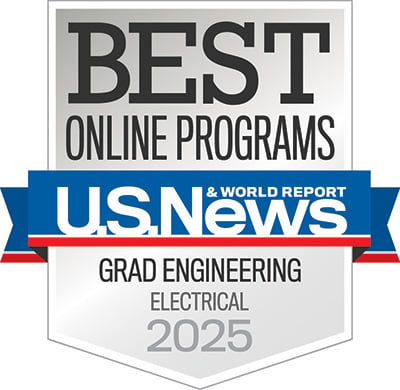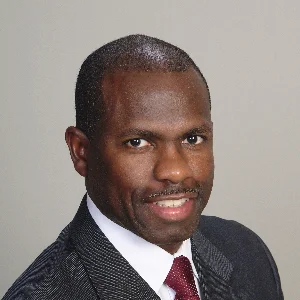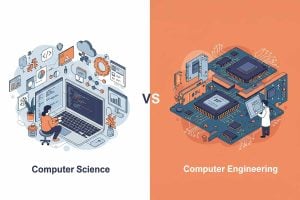
Electrical and Computer Engineering Program Overview
Johns Hopkins Engineering for Professionals Electrical and Computer Engineering online, part-time master’s program is one of the largest in the country. And our highly regarded program is one of the best, ranked #3 by U.S. News & World Report.
We value the opportunity to create a hands-on experience. That’s why each student can remotely connect to equipment on campus to conduct measurements. We offer a wide breadth of courses to align with your area of expertise and interests, from computer engineering to satellite communications (instructed by a professor involved in NASA’s New Horizons Pluto mission) to systems and controls.

From a thorough grounding in foundational topics such as electromagnetics, electronic devices, and systems theory, to building the hardware and software architectures of next-generation mobile platforms, students gain valuable skills and knowledge and will be able to:
- Demonstrate the ability to apply advanced electrical and computer engineering theory and methods to translate functional system descriptions into component-level designs and structures.
- Demonstrate the ability to design and conduct experiments or simulations, as well as analyze and interpret the results.
- Demonstrate proficiency in the use of advanced mathematical and analytical techniques and modern engineering tools necessary for engineering practice.
Master’s Degree Concentrations
A focus area/concentration can be selected but is not required. Your choice of concentrations will appear on your transcript upon graduation.
- Communications and Networking: Study the engineering behind today’s communications networks.
- Photonics: Study how fiber optics, lasers, and more can be used in labs and through practical applications.
CONCENTRATION REQUIREMENTS
Master’s Degree Focus Areas
A focus area/concentration can be selected but is not required. Your choice of focus area will not appear on your diploma upon graduation but provide tailored study in interests in the selected areas.
- AI and Autonomous Systems: Study fundamental technologies and theory related to the analysis and design of autonomous systems and the confluence of the theory and application of artificial intelligence concepts to enhancing the capabilities of these systems.
- Communications and Networking: Study the engineering behind today’s communications networks.
- Computer Engineering: Study the engineering behind advanced computing data systems, architecture, and more.
- Electronics and Solid State: Study the theories, designs, and systems behind circuits and electronic materials.
- Optics and Photonics: Study how fiber optics, lasers, and more can be used in labs and through practical applications.
- RF and Microwave Engineering: Study electromagnetic transmission, advanced antenna systems, and radio wave manipulation.
- Signal Processing: Study the practical application of signal processing through real-time computer vision, machine learning, digital signal processing, and more.
- Systems and Controls: Study the connections between different engineering systems and the theory that controls them.
Focus Area Requirements
Programs
No matter where you are in your career, taking the next step has never been easier with our online and part-time options. The Engineering for Professionals program offers three options for Electrical and Computer Engineering; you can earn a Master of Science in Electrical and Computer Engineering, a Graduate Certificate, or a Post-Master’s Certificate.
Electrical and Computer Engineering Courses
Get details about course requirements, prerequisites, concentrations, focus areas, and electives offered within the program. All courses are taught by subject-matter experts who are executing the technologies and techniques they teach. For exact dates, times, locations, fees, and instructors, please refer to the course schedule published each term.
Program Contacts
-
 Email:cleon.davis@jhu.edu
Email:cleon.davis@jhu.edu
-
Ramsey Hourani
Program Manager Electrical and Computer Engineering Email:rhouran5@jhu.edu
Email:rhouran5@jhu.edu
-
Neil Palumbo
Program Manager Electrical and Computer Engineering Email:npalumb1@jhu.edu
Email:npalumb1@jhu.edu
-
 Email:jeffrey.chavis@jhu.edu
Email:jeffrey.chavis@jhu.edu
-
Email:azylins1@jhu.edu
-
Email:Brittany.Quinn@jhuapl.edu
Tuition and Fees
Did you know that 78 percent of our enrolled students’ tuition is covered by employer contribution programs? Find out more about the cost of tuition for prerequisite and program courses and the Dean’s Fellowship.
“I enjoyed the ability to take courses on my time. I selected an online program instead of an in-person program for the flexibility. My position and work would not allow me to leave during the day for courses, but the EP program allowed this. I found many of my instructors to be helpful and care about the students. ”
Why Hopkins?
When ambition meets opportunity, anything is possible. Earn your degree on your terms at Johns Hopkins Engineering for Professionals.

Multiple Ways to Learn - Take courses completely online, on-site, or through a hybrid of both. We also offer virtual live—a synchronous, live instruction option that allows you to take a course at a scheduled time, with your classmates, but in your own space. Learn More

Learn on Your Terms - Develop the in-demand knowledge to achieve your personal career goals in your field of choice—on your schedule. Choose modern, relevant courses to design the learning experience that best fits your objectives. Learn More

Career-advancing Education - Coursework incorporates industry-specific knowledge that you can use from day one. As a graduate, you will be prepared to advance your career, cross over into other engineering fields, take on leadership roles, and increase your income-earning potential.
Electrical and Computer Engineering FAQs
All master’s programs provided by Engineering for Professionals must be completed within five years of acceptance into the program. Students may take one, two, or more classes a semester or consult with their advisor to schedule semesters off to match their schedules and needs.
On average, professionals with an electrical and computer engineering master’s make around $96k after completing their degrees.
No. If pursuing the master’s option, you will graduate with a single degree: a Master of Science in Electrical and Computer Engineering. The certificate programs also provide a single certificate. The curriculum is combined into a single program of study.
Applications are evaluated on a rolling admissions basis. We normally have a 4–6 week turnaround time once we have received every required piece of the application.
The Engineering for Professionals program was designed with working professionals in mind. Therefore, we offer both synchronous and asynchronous courses to accommodate your busy schedule.
“The availability of courses was awesome. There was always a course I wanted to take and if a course I wanted to take didn’t fit in my schedule I knew that I would have an opportunity to take it in the near future. I also liked all my instructors. They were all very knowledgeable and very helpful in answering questions whenever they arose. ”
Academic Calendar
Find out when registration opens, classes start, transcript deadlines and more. Applications are accepted year-round, so you can apply any time.


